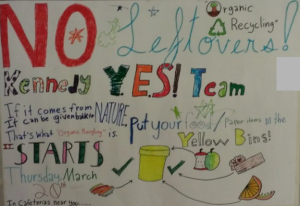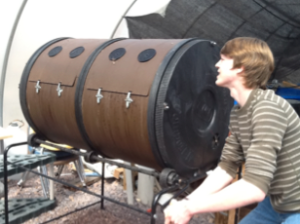Recently YES! Coordinator Jim DeVries wrote this article:

As we approach the holiday season, families often gather together to share a meal and catch up on family news. One of the big things that often happens after a big meal is all the food left on plates and often in the serving dishes gets scraped into the garbage, everyone too full to think about leftovers. I challenge you to think differently this holiday season. Food waste is at epidemic proportions in the US. According to the National Resource Defense Council, 40% of the food produced in the US goes to landfills unused. That equates to over $165 billion rotting away in our dumps. Another issue created by this problem is that the rotting food in landfills is a large producer of methane gas, contributing to climate change.
So how can we reduce the amount of food that ends up in landfills? There are many good options to consider this holiday feasting season:
1. Choose your portions carefully so you don’t take more food than you plan to eat.
2. Learn to be creative with leftovers. (One great sandwich after Thanksgiving is a turkey sandwich with cream cheese, cranberries and lettuce on whole grain bread.)
3. If you are not going to be eating the leftovers soon, make sure to freeze them for a later meal.
4. Supplement food for pets or livestock with food you are not going to eat. Table scraps could be fed to the household dog, thus reducing the amount of food purchased specifically for her. If you live in a farming area, you could gather up the surplus food and offer it to a local hog farmer to feed out to his livestock. Many farmers would even be willing to travel to collect larger quantities of food waste from schools or other large food service operations.

5. Compost food scraps instead of landfilling them. When composting, you should not add any meat or meat by-products because they attract nuisance animals such as bears and raccoons. But composting vegetable matter will offer you rich fertilizer for the garden in the summer. If you are not a gardener, there most likely is someone in your neighborhood who would welcome a wheel barrow full of rich compost to add to their gardens.
6. Large quantities of oil, for example from the deep fried turkey dinner, can be rendered down to make a biofuel to power a car or to be burned for heat. There are facilities around the state that will process waste vegetable oil into a valuable bio-fuel. You may not be producing enough off one turkey to heat your house for the winter, but combined with that from fast food restaurants and other consumers, we can offset the need for hundreds of gallons of petroleum based heating fuel.
Don’t feel like you have to take on the entire 40% all by yourself, but every small step taken will help to reduce the overall problem. The NRDC says that a reduction of 15% would provide enough food to feed 25 million Americans who suffer from food insecurity. In this holiday season, be thankful for the food we have, but also be aware of what we end up throwing out.
